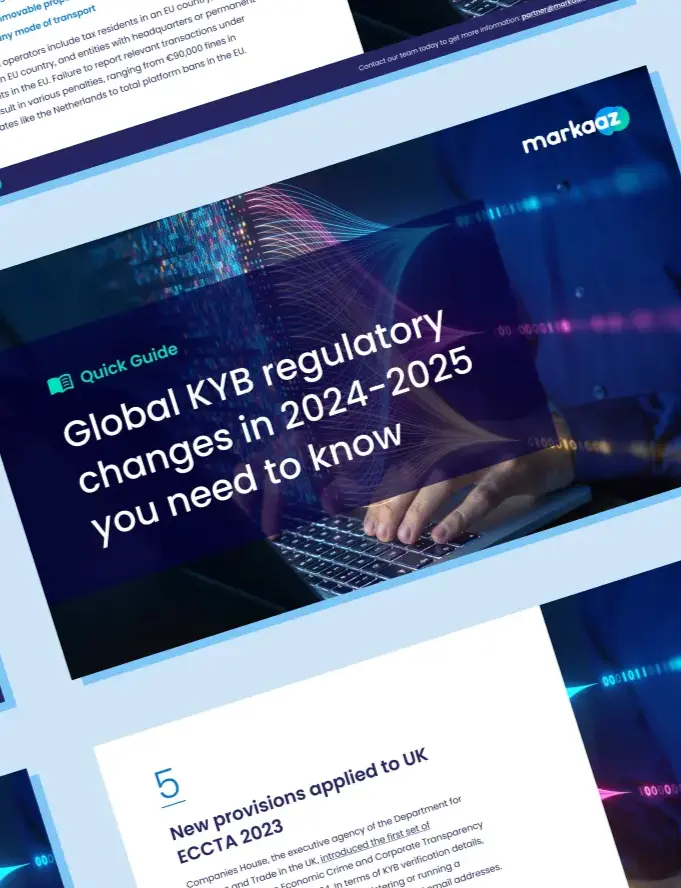In today’s challenging data environment, efficiently verifying the legitimacy and compliance of new business clients is often a difficult, and costly, part of the onboarding process. Even if you already have a business verification solution in place, it doesn’t mean it’s performing as it should.
Many solutions return inaccurate results that generate false positives and negatives, costing businesses millions in missed revenue opportunities, fraudulent transactions, and hefty compliance fines. Other solutions can only verify portions of new customer lists, which often results in the rejection of legitimate businesses. Below, we delve into five reasons why your business verification solutions are slowing your business down.
1. A lack of automated, integrated solutions
Business customers expect a seamless and frictionless identity verification process, so they’re understandably frustrated when it takes days or even weeks to verify and approve their business applications. The current prolonged delay is often the result of manual verification processes, which require requesting documents from commercial registers, checking regulatory and compliance lists, and verifying business officer identities and Ultimate Beneficial Owners (UBOs). All this is time-consuming, tedious, and error-prone. Relying on manual verification often results in:
- False rejections or compliance flags from manual data entry
- Customer abandonment from lengthy approvals
- Deep backlogs on verification requests
- Higher costs in staffing, wages, and training
An automated, integrated business identity solution conducts verifications in real time. These application programming interfaces (APIs) seamlessly integrate into your existing workflows, making them easy for developers to set up in your ecosystem. They provide a high-security environment that allows for the smooth transfer of data between systems, which enables teams to validate business and ownership identity against data sources. As a result, this significantly reduces the need for manual data entry in multiple applications, which minimizes the risk of subsequent errors and shortens approval turnaround.
2. Using only web-crawled data
Business verification relies on accurate business data, but according to Harvard Business Review research, only 3% of business data meets basic quality standards.
For data companies looking to provide accurate business information, the process of aggregating data from multiple sources into one database is challenging, and it still results in inaccurate records. Since data inconsistencies and variations are collected and stored in so many places, creating one accurate business record is a considerable feat. It takes time, deep expertise, and dedicated technology investments even to try and tackle this industry-plaguing problem.
To get around this, many of today’s verification services take a different approach — they crawl the web to collect publicly available business data for specific business customers. However, these verification services create business records on an ad-hoc basis from public information, resulting in extended delays, inaccurate matches, or incomplete verification results.
3. Overly focused on data sources
To improve the accuracy of data, some companies have assembled robust databases. Usually, this process is done by pre-aggregating data from multiple sources. This has the benefit of having business information on hand, ready to go for instant data recall, which can speed up verification.
Many companies use similar data sources like Secretary of State databases, registrars, third-party sources, and public information. However, the key to accurate information is not in the source data, but in the ability to handle the inconsistencies and errors that challenge most data companies and prevent them from creating a single accurate business record. If you can’t resolve inconsistencies in data, you’ll have trouble getting good match rates and verifying businesses.
Markaaz resolves this by using a proprietary matching algorithm designed by some of the field’s leading data experts. This unique algorithm matches data elements across multiple sources, assessing all available variations. It then selects the best information across these sources to create a uniquely accurate business record. The result is a database of over 300 million superior business records covering business health and solvency, firmographics, and compliance data. With Markaaz’s Business Verification API Suite, enterprises can directly tap into the Markaaz Directory for instant verification results. This vastly improves the accuracy of verifications, reducing false negatives and scaling approval volumes of legitimate businesses.
4. Access to accurate small business information
For enterprises looking to serve small businesses, finding accurate information is extremely difficult. A single small business might have several different records in a business intelligence database because of data variations that occur from simple errors, like spelling mistakes. Small business records also tend to lack the detailed information needed to verify them, and even if records are available, they can quickly become outdated due to company growth and attrition.
Given these challenges, it is difficult to find a provider who can provide the accurate data needed for confident small business verification and onboarding. Most traditional data companies specialize in medium or large B2B information, which leaves a gap in the market for this important business customer segment.
Markaaz created a database of over 300 small million business records to address this issue. The Markaaz Directory is an unrivaled source of accurate SMB information that provides real time access to the business data enterprises need to verify and streamline their onboarding processes. Enterprises can validate firmographic and business health information, such as legal entity, primary address, business officer, employee counts, and business credit scores, and screen for compliance risks. This superior database provides one source of truth so enterprises can solve the SMB data issues plaguing their onboarding processes.
5. Not finding a scalable data partner
Your business verification solution needs to scale to your business needs. For enterprises with large customer portfolios, you need a business verification partner that can match these growing volumes of customers. This ensures your onboarding process remains efficient, effective, and unique to your business, regardless of size or complexity. For this, businesses need to look for a partner that has the best chance of having access to the business records they need. Without this scale, you might have to reject a legitimate customer.
Alongside that, it’s important that any partner you choose is flexible, offering solutions that you can customize to your processes or build on to design a solution that suits your business best. The best partners rely on cloud-based technology stacks to offer this flexibility and scalability, which allow you to grow your onboarding solution quickly and efficiently.
Bring better business verification to your business
In sum, these five challenges hinder the efficiency and accuracy of an enterprise’s business verification process, leading to the loss of legitimate clients.
The lack of automated, integrated solutions and reliance on web-crawled data contribute to delays, inaccuracies, and incomplete results. Moreover, the inability to source accurate small business information, which tends to be particularly fragmented and outdated, can mean small businesses are incorrectly rejected from vital services your enterprise can offer.
Markaaz’s Directory and Business Verification API Suite help you overcome these challenges, with access to over 300 million small business records to source and validate accurate business data in real time. Connect with our team to learn more about how to integrate a scalable and reliable business verification solution for your business.



